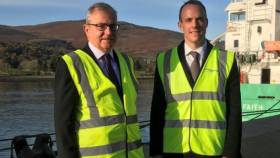Displaying items by tag: Brexit Minister
No-Deal Disruption Says Brexit Minister at Holyhead Port 'Can Be Avoided'
#ferries - There have been calls for the UK Prime Minister to remove the threat of a no-deal Brexit have been repeated by the Counsel General and Brexit Minister Jeremy Miles, following a visit to Holyhead Port.
As ITV News reports, he met with the Port's manager, Captain Wyn Parry, who set out some of his concerns about operations in Holyhead if the UK crashes out of the EU without a deal.
Welsh ports are the gateway between Ireland and the rest of Europe, with 80% of goods carried in Irish-registered HGVs between the Republic of Ireland and Europe passing through Welsh ports.
Holyhead is the second busiest roll-on roll-off ferry port in the UK - providing the link in the supply chain for businesses across Wales, the UK and Ireland.
To read a comment by the Brexit Minister, click here.
#Ports&Shipping - The Brexit Secretary reports BBC News, has pledged that the government will not sign up to any deal which could threaten the UK's constitutional integrity.
Dominic Raab made the comments after a one-day visit to Northern Ireland, where he met with businesses in Warrenpoint and Larne, and he also met with politicians at Stormont.
Asked three times if the government had ruled out any new regulatory checks at the Irish Sea ports, he said: "We are engaged in a negotiation process". He added that he was not going to engage in a running commentary but said the UK position was "we want to preserve the internal market within the United Kingdom".
For more on the whistle-stop tour by the Minister click here.
In addition Afloat noted on BBC 1 Newsline's related coverage yesterday, Arklow Faith docked in Warrenpoint Port. The Irish flagged short-sea trader is seen in spectacular footage (video) while ploughing into heavy seas as part of the advance promotion of the recent RTE 1 series 'The Great Lighthouses of Ireland' which concluded last month.
The four part documentary series highlighted the lives and roles played by the former Lighthouse keepers and their families and Irish Lights continued critical duties in providing aids to navigation for seafarers and shipping on an all island basis.
Shipping such as Arklow Faith which today departed Warrenpoint and was tracked by Afloat in the Irish Sea before entering St. Georges Channel this afternoon. The 89m general cargoship is bound for the UK port of Rochester, located near Chatham on the River Medway that leads off the Thames estuary.































































